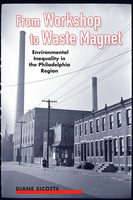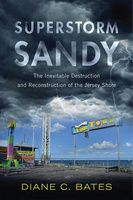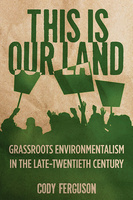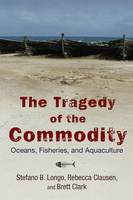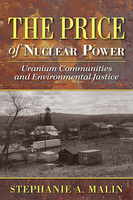Showing 16-21 of 21 items.
Vanishing Bees
Science, Politics, and Honeybee Health
Rutgers University Press
In 2005, beekeepers in the United States began observing a mysterious and disturbing phenomenon: once-healthy colonies of bees were suddenly collapsing, leaving behind empty hives. As it explores the contours of this crisis, Vanishing Bees considers an equally urgent question: what happens when beekeepers, farmers, scientists, agrichemical corporations, and government regulators approach the problem from different vantage points and cannot see eye-to-eye? The answer may have profound consequences for every person who wants to keep fresh food on the table.
From Workshop to Waste Magnet
Environmental Inequality in the Philadelphia Region
Rutgers University Press
From Workshop to Waste Magnet presents Philadelphia’s environmental history as a bracing case study in mismanagement and injustice. Tracing the complex interactions among economic decline, federal regulations, local politics, and shifting ethnic demographics, sociologist Diane Sicotte uncovers how only a few communities came to host many types of polluting or waste disposal land uses. What she finds reveals the devastation that occurs when mass quantities of society’s wastes mix with toxic levels of systemic racism and inequality.
Superstorm Sandy
The Inevitable Destruction and Reconstruction of the Jersey Shore
Rutgers University Press
Why do people build in areas open to repeated natural disasters? Drawing on a variety of insights from environmental sociology, Superstorm Sandy offers a wide-ranging look at the Jersey Shore both before and after this disaster, examining the many factors—such as cultural attachment, tourism revenues, and governmental regulation—that combined to create a highly vulnerable coastal region and that fueled the demand to rebuild.
This Is Our Land
Grassroots Environmentalism in the Late Twentieth Century
Rutgers University Press
In This is Our Land, environmental historian Cody Ferguson documents a little-noted but important change in the environmental movement, describing three representative grassroots groups—in Montana, Arizona, and Tennessee—whose stories show how quite ordinary citizens can band together to solve environmental problems. As they did, they redefined political participation and expanded the ability of citizens to shape their world.
The Tragedy of the Commodity
Oceans, Fisheries, and Aquaculture
Rutgers University Press
The Tragedy of the Commodity explores the role of human agency in the overfishing crisis, highlighting the social and economic forces behind this looming ecological problem. In a critique of the classic theory “the tragedy of the commons” by ecologist Garrett Hardin, the authors argue that it is the commodification of aquatic resources that leads to the depletion of fisheries and the development of environmentally suspect means of aquaculture.
The Price of Nuclear Power
Uranium Communities and Environmental Justice
Rutgers University Press
In The Price of Nuclear Power, environmental sociologist Stephanie Malin offers an on-the-ground portrait of several uranium communities caught between the harmful legacy of previous mining booms and the potential promise of new economic development. An insightful look at the local impact of the nuclear renaissance and community members’ shifting notions of environmental justice, this book warns that this industry needs to be closely followed to mitigate the social and environmental tensions inherent in the rebirth of uranium mining.
Stay Informed
Subscribe nowRecent News


